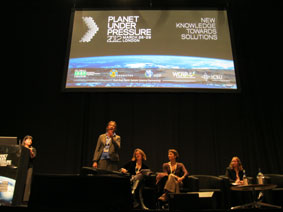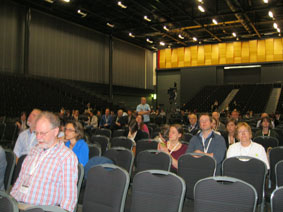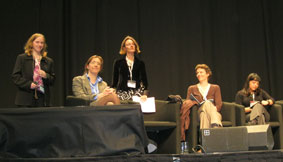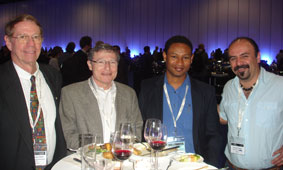Planet Under Pressure 2012:
New Knowledge Towards Solutions
London, England, 26-29 March 2012
The global change research programmes of the International Council for Science (ICSU) organized a major science conference in London, England, on 26-29 March 2012 titled: Planet Under Pressure 2012: New Knowledge Towards Solutions. The conference aimed to provide scientific leadership towards the 2012 UN Conference on Sustainable Development - Rio+20. With nearly 3,000 participants, many significant plenary speakers, over 120 parallel sessions for paper presentations, 113 poster sessions, and many other events, the four days were rich in scientific exchanges, sharing of new knowledge and perspectives, and cross-disciplinary dialogues around the state of the planet and the role of science in moving towards sustainability. At least 3,000 more people participated in the conference online.

The ExCell International Conference Centre on the Thames in London, site of the PUP Conference
IEF members took an active part in the conference, with IEF board member Sylvia Karlsson-Vinkuyzen of Wageningen University co-organizing a session with Johanna Alkan Olsson of Lund University on "Bridging the knowledge-action gap: the role of values for transforming lifestyles". This included papers on the values-based indicators project presented at the 14th IEF Conference in Brighton, UK, in 2010, including a keynote presentation by Gemma Burford and a contribution by Arthur Dahl on an "Ethical sustainability footprint for individual motivation". The research discussed went beyond identifying the knowledge-action gap and instead presented strategies and tools for how enable values to support the transition to sustainable lifestyles. The session was placed by the organizers in the main auditorium, and attracted over a hundred, with a dynamic discussion following the presentations, and considerable interest in the values-based indicators.
A press release from the conference that summarized the main points of the values session is available at http://www.planetunderpressure2012.net/pdf/pr_29_03_12_gap_knowledge_an…. Among the key messages were:
 Values are multilayered in the sense that they are manifested within individuals and groups and at the level of society as social norms. Values at these difference levels are interrelated and may be contradictory.
Values are multilayered in the sense that they are manifested within individuals and groups and at the level of society as social norms. Values at these difference levels are interrelated and may be contradictory.
 Values have multiple sources, people draw on a diversity of sources for the values, principles and social norms that inspire and guide them in their life choices. These sources can include family, community, culture, societal discourse and faith.
Values have multiple sources, people draw on a diversity of sources for the values, principles and social norms that inspire and guide them in their life choices. These sources can include family, community, culture, societal discourse and faith.
 Values are not static, they are actively nurtured and reinforced through social and cultural interaction, including education. Some are more easily changeable and others are more deeply embedded in habits and social norms of a specific cultural context.
Values are not static, they are actively nurtured and reinforced through social and cultural interaction, including education. Some are more easily changeable and others are more deeply embedded in habits and social norms of a specific cultural context.
 The key strategy is one of stimulating (self-)reflection of values at several levels, individual, collective, institutional.
The key strategy is one of stimulating (self-)reflection of values at several levels, individual, collective, institutional.
There were several proposals for evaluation tools for reflecting on values at these different levels: footprints (individual), indicators (group) and ethical deliberation institutions. By using these tools a structured self-reflection can work as empowerment for the ability to act.
 .
.  .
. 
The values-action gap session in the main auditorium; a small part of the audience; the speakers, including Gemma Burford (left) and co-chair Sylvia Karlsson-Vinkhuyzen (second from left)
In another session on "Challenges of integration", Sylvia and Arthur had a joint poster contribution on "Challenges in the Integration of Systems Knowledge for Governance of the Earth System".
Arthur gave a paper in a session on "Exploring effective architecture for emerging agencies in international environmental governance" on the topic "Design criteria and learning strategies for International Environmental Governance".
Following on from the contribution on migration that IEF has made earlier to the UN Human Rights Council Social Forum and the bureau of the UN Conference on Sustainable Development, Arthur also contributed to a session on "Governing global environmental change-induced migration across scales" with a paper on "Science, governance and ethics in environmental migration".

Arthur Dahl (left) with scientists from the USA, Cameroon and Mexico
The conference issued a State of the Planet Declaration that summarized the main points raised during the debates, and was supported by many important scientists and UN Secretary-General Ban Ki-moon.
Some of the main points raised in the declaration are:
1. Research now demonstrates that the continued functioning of the Earth system as it has supported the well-being of human civilization in recent centuries is at risk. Without urgent action, we could face threats to water, food, biodiversity and other critical resources: these threats risk intensifying economic, ecological and social crises, creating the potential for a humanitarian emergency on a global scale.
2. In one lifetime our increasingly interconnected and interdependent economic, social, cultural and political systems have come to place pressures on the environment that may cause fundamental changes in the Earth system and move us beyond safe natural boundaries. But the same interconnectedness provides the potential for solutions: new ideas can form and spread quickly, creating the momentum for the major transformation required for a truly sustainable planet.
3. The defining challenge of our age is to safeguard Earth’s natural processes to ensure the well-being of civilization while eradicating poverty, reducing conflict over resources, and supporting human and ecosystem health.
4. As consumption accelerates everywhere and world population rises, it is no longer sufficient to work towards a distant ideal of sustainable development. Global sustainability must become a foundation of society. It can and must be part of the bedrock of nation states and the fabric of societies.
A. NEW KNOWLEDGE
6. Humanity has taken a huge leap and become a planetary-scale force. Significant changes have occurred since the 1950s, and the rate of change is accelerating. Researchers observe unsafe levels of pollution, ecological change and resource demand, with potentially catastrophic consequences for our global civilisation.
7. The past decade has seen the emergence of important areas of new scientific understanding by which to define what we are witnessing:
A1. Humanity’s impact on the Earth system has become comparable to planetary-scale geological processes such as ice ages. Consensus is growing that we have driven the planet into a new epoch, the Anthropocene, in which many Earth-system processes and the living fabric of ecosystems are now dominated by human activities. That the Earth has experienced large-scale, abrupt changes in the past indicates that it could experience similar changes in the future. This recognition has led researchers to take the first step to identify planetary and regional thresholds and boundaries that, if crossed, could generate unacceptable environmental and social change.
A2. The Earth system is a complex, interconnected system that includes the global economy and society, which are themselves highly interconnected and interdependent. Such systems can confer remarkable stability and facilitate rapid innovation. But they are also susceptible to abrupt and rapid changes and crises, such as global financial meltdowns or the volatility of the global food system.
A3. Assessments of current mechanisms for governing global environmental change show why existing international arrangements are not dealing quickly enough with current global challenges such as climate change and biodiversity loss. There is growing evidence that diverse partnerships amongst local, national and regional governments as well as business and civil society provide essential safety nets should singular global policies fail – a polycentric approach for planetary stewardship.
8. These insights from recent research demand a new perception of responsibilities and accountabilities of nation states to support planetary stewardship. This requires goals aimed at global sustainability in order to achieve universal sustainable development. A crucial transformation is to move away from income as the key constituent of well-being and to develop new indicators that measure actual improvements in well-being at all scales. Equity in opportunities to improve well-being and eradication of poverty at the individual level will also play pivotal roles in the transition towards planetary stewardship.
B. NEW SOLUTIONS
9. Interconnected issues require interconnected solutions. Rapid scientific and technological progress can provide potential solutions – if adopted in timely manner – to reduce the risk of deleterious consequences for societies everywhere. But technological innovation alone will not be enough. We can transform our values, beliefs and aspirations towards sustainable prosperity.
10. Research plays a significant role in monitoring change, determining thresholds, developing new technologies and processes, and providing solutions. The international global-change research community proposes a new contract between science and society in recognition that science must inform policy to make more wise and timely decisions and that innovation should be informed by diverse local needs and conditions. This contract needs to encompass three elements:
B1. Integrated goals for global sustainability based on scientific evidence are needed to provide essential targets for societies. In support of this, the international scientific community calls for a framework for regular global sustainability analyses that link existing assessments that build on the foundations of the Intergovernmental Panel on Climate Change, Intergovernmental Platform on Biodiversity and Ecosystem Services and other ongoing efforts. Such analyses can be designed to bring coherence to the science-policy interface.
B2. The challenges facing a planet under pressure demand a new approach to research that is more integrative, international and solutions-oriented. We need to link high-quality focused scientific research to new policy-relevant interdisciplinary efforts for global sustainability. This research must integrate across existing research programmes and disciplines, across all domains of research as well as local knowledge systems, across the North and South, and must be co-designed and implemented with input from governments, civil society, research funders, and the private sector. As part of this new collaboration, at this conference the global-environmental-change programmes support a major research initiative, Future Earth: research for global sustainability.
B3. New mechanisms to facilitate an interactive dialogue on global sustainability among the various stakeholders and the policy-making community at different scales. Such interactions should be designed to bring societal relevance and trust to science-policy interfaces, and more effectively inform decision-making to keep pace with rapid global change.
11. To these ends, the initiatives above must be supported by:
• A greater commitment to fund and support capacity-building in science and education globally, and particularly in developing countries.
• A strong commitment to both applied and pure research and increased efforts to bring together disciplines, across all research domains.
• Strengthened support for observing systems, particularly in developing countries, including the new observations needed to support decision-making for global sustainability. New approaches should fully integrate global observing systems for environmental and social issues.
• Continued exploration of new areas of knowledge, such as theoretical and applied research in behavioural science and economics addressing ecological and social tipping points and irreversibility at multiple levels.
C. NEW OPPORTUNITIES: SCIENCE IN SUPPORT OF RIO+20
12. The United Nations Rio+20 Conference is an opportunity the world must seize at this crucial juncture. The UN Secretary-General’s Global Sustainability Panel report, Resilient People, Resilient Planet, provides a strong strategic framework for a sustainable future while calling for a marked strengthening of the interface between science and policy. The findings of the Planet Under Pressure conference support the key recommendations including:
C1. Fundamental reorientation and restructuring of national and international institutions is required to overcome barriers to progress and to move to effective Earthsystem governance. Governments must take action to support institutions and mechanisms that will improve coherence, as well as bring about integrated policy and action across the social, economic and environmental pillars. Current understanding supports the creation of a Sustainable Development Council within the UN system to integrate social, economic and environmental policy at the global level. There is also strong support for strengthening global governance by including civil society, business and industry in decision-making at all levels.
C2. A commitment to the proposal for universal Sustainable Development Goals is needed, as goals for Global Sustainability. These should be developed to take account of the synergies and trade-offs in and between areas such as food, water and energy security, maintenance of biodiversity and ecosystem services, sustainable urbanisation, social inclusion and livelihoods, protection of seas and oceans, and sustainable consumption and production. The research community should be involved in the development of goals, targets and indicators, recognising interconnected issues and building on existing measures of well-being. They should apply to all levels of governance.
C3. Recognition of the monetary and non-monetary values of public goods such as ecosystem services, education, health and global common resources such as the oceans and the atmosphere. These must be properly factored into management and decision-making frameworks at the national and sub-national levels to ensure that economic activities do not impose external costs on the global commons. Corrective measures that internalize costs and minimize the impacts on the commons need to be identified and implemented through regulatory and market-based mechanisms.
2012: A DEFINING MOMENT IN HISTORY
13. Our highly interconnected global society has the potential to innovate rapidly. The Planet Under Pressure conference has taken advantage of this potential to explore new pathways. It has marked a new direction for global change research. The international scientific community must rapidly reorganize to focus on global sustainability solutions. We must develop a new strategy for creating and rapidly translating knowledge into action, which will form part of a new contract between science and society, with commitments from both sides.
14. Society is taking substantial risks by delaying urgent and large-scale action. We must show leadership at all levels. We must all play our parts. A strong contribution from all stakeholders should make the UN’s Rio+20 conference a defining moment that sparks global innovation to move us towards a sustainable future. We urge the world to grasp this moment and make history.
